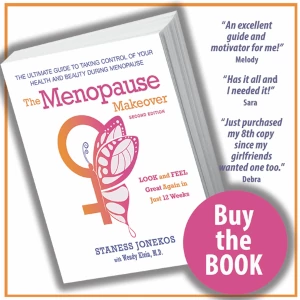by Staness Jonekos, co-author of The Menopause Makeover
 The baby boomers may have been the generation of the sexual revolution, but for many slamming into menopause, sex is the last thing on their minds! Both sexes can suffer from a declining libido as we age, but women don’t have a little blue pill to pop to get their mojo back. What’s a menopausal girl do to reignite the flame of desire?
The baby boomers may have been the generation of the sexual revolution, but for many slamming into menopause, sex is the last thing on their minds! Both sexes can suffer from a declining libido as we age, but women don’t have a little blue pill to pop to get their mojo back. What’s a menopausal girl do to reignite the flame of desire?
After women pass through perimenopause into menopause, almost 50 percent are left with an unanticipated loss of libido and vaginal dryness. Vaginal dryness can affect the libido.
Estrogen, important for maintaining vaginal health and lubrication, is the hormone that actually plumps up the cells in the vagina. When estrogen levels decline, the vaginal walls can become thinner, less elastic and dryer.
Not only does the physical act of intercourse become a challenge as a result of vaginal dryness, but the emotional dialogue that goes on in one’s head when lubrication no longer comes naturally, can increase stress levels for the woman and the man. This double whammy can end in frustration and confusion.
Treatment Options
- Bioadhesive lubricant, such as AstroGlide, can provide immediate relief. Replens, a vaginal moisturizer, may be applied twice a week. Lubrication can offer vaginal protection and both are available over-the-counter.
- If vaginal dryness is your only menopause symptom, you may consider using local estrogen treatment.
- Low dose hormone therapy may bring relief.
It is important to discuss vaginal dryness with your doctor to confirm that you are not suffering from a vaginal infection.
Approximately 47 percent of women experience sexual difficulties, according to the National Health and Social Life Survey and the Global Study of Sexual Attitudes and Behaviors, with a decrease of sexual desire being the most common.
Other aspects that may contribute to a declining libido are pain during intercourse, lack of sexual thoughts, aversion to sexual activity, lack of receptivity and relationship dissatisfaction.
Addressing the physical, emotional, and environmental changes that often accompany mid-life, can make a proper diagnosis challenging.
Factors that affect sexual health
- Emotional: Feeling unattractive, being depressed, feeling tired, suffering from lack of sleep, moodiness, feeling isolated, not being happy
- Fluctuating hormones
- Medications:
- Antidepressants
- Mood stabilizers
- Contraceptive drugs
- Antihistamines
- Sedatives
- Antihypertensives
- Blood pressure medications
- Medical conditions:
- Depression
- Thyroid disease
- Androgen insufficiency
- Diabetes
- Cardiovascular disease
- Neurological disorders
- Cultural issues
- Relationship satisfaction
- Midlife stress: career change, relationships, loss, divorce, caring for parents and financial concerns
If you are suffering from hot flashes and a poor self-image, combined with taking antidepressants and blood pressure medications, can be a recipe for a declining libido.
As many as half the patients who take SSRIs report some sexual dysfunction.
Per The North American Menopause Society (NAMS): “In contrast, the antidepressant bupropion (Wellbutrin), which works in a different way from SSRIs, was found to improve sexual functioning compared with placebo in a small study of nondepressed women and men with desire and arousal difficulties. This finding is interesting but requires more study to confirm it before bupropion should be used specifically for treating sexual problems.”
Once you find the culprit that kidnapped your mojo, you have options.
Managing a declining libido
- Discuss options with your practitioner. If fluctuating hormones are affecting your libido, there are therapies available.
- Review current medications and medical conditions.
- Talk to your partner
- Consider counseling or sex therapy, or both
- Adjust lovemaking activities: try warm baths before genital sexual activity, extend foreplay, incorporate massages, change your sexual routine, experiment with positions, discuss sexual fantasies
- Use lubrication
- Maintain a healthy lifestyle, exercise most days of the week, and consume alcohol moderately
- Commit to new stress-management practices, like acupuncture, biofeedback, yoga
When women notice that their sex drive is diminishing; many seek out a prescription from their doctor for a does of testosterone thinking it will fix the problem.
Dr. Wendy Klein, co-author of The Menopause Makeover, says “The use of testosterone to treat a diminished libido is still controversial. The FDA has not approved testosterone therapies for women suffering from a declining libido, but there have been preliminary scientific studies and extensive anecdotal reports that support the use of this therapy for improving the libido.”
A little compounded testosterone gel may be worth considering, but keep in mind that it has not been FDA-approved to treat a declining libido and long-term safety data is lacking. Women who are on testosterone therapy should be monitored for increased lipids, excessive hair (hirsutism) and acne.
DHEA is another hormone that is often promoted as a libido booster. When you purchase DHEA, it is a dietary supplement, not a drug that is regulated by the government.
Dr. Wendy Klein says, “If your DHEA level is tested and shown to be below normal, then it may be reasonable to take a supplemental dose of 25-50 mg daily. However, if your DHEA level is normal, then there is no reason to take DHEA as a supplement.”
If you do decide to use an alternative therapy be sure to tell your healthcare provider so that he or she can be on the lookout for side effects and interactions.
Besides the effects of menopause, it is also normal for your libido to decline with age. Between the ages of 55 and 65 sexual activity slows for men and women, but don’t give up.
There are many benefits to having a healthy sex life:
- Sex burns about 200 calories during 30 minutes of active sex.
- Regular sex promotes circulation and lubrication.
- Having sex three times a week can make you look and feel ten years younger, thus boosting self esteem.
- Sex is the safest sport you’ll ever enjoy.
- Sex releases endorphins into the bloodstream producing a sense of euphoria that can reduce depression.
- Sex is a stress reliever. It is ten times more effective than Valium.
- Sex can relieve headaches by releasing the tension that restricts blood vessels in the brain.
- Sex is a natural antihistamine that can help with asthma and hay fever.
- Sex can lower your cholesterol by tipping the HDL/LSL (good kind/bad kind) cholesterol balance towards the HDL (good) side.
- Regular sex can boost estrogen levels. Estrogen keeps your hair shinny and skin smooth; helps reduce the chances of getting dermatitis, and rashes.
- The actual sex act triggers the release of oxytocin that promotes more good feelings.
- Sex can help you sleep better because the levels of oxytocin, a sleep-inducing hormone, can be five times higher than normal during love making.
Discussing your declining libido with your healthcare provider and partner is the first step to managing a healthy sex life. It is also a perfect time to build strong communication skills with your partner. The more your partner understands your menopausal journey the more supported you may feel. If less sex is agreeable to you and your partner, enjoy other bonding activities. Men may also notice changes that can affect their libido. Being able to discuss your libido will open the door for him to connect and communicate as well.
Going through menopause can be exhausting. Feeling good about yourself when everything is changing, from your waistline to your sex life, can be challenging. Often, nonhormonal options may rescue a lagging libido and spice up your sex life.
Once you have passed through the doors of perimenopause, feeling sexy is possible with proper management. With continued interest, you can get your groove back and feel sexy during menopause and beyond.
















